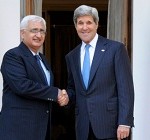The U.S. secretary of state, John Kerry, is in India. Among other engagements, Kerry will take part in the fourth India-U.S. strategic dialogue in New Delhi. On the agenda are a slew of bilateral issues, from the status of the civil nuclear agreement, to H1B visas, to increased access for U.S. companies in India.
It may sound like more of the same old stuff. But this bilateral comes at a politically significant moment, when a) the Taliban has established an embassy-cum-government in exile in Qatar, with U.S. blessing; b) India and the U.S. have both been paid a visit by the new Chinese leadership; c) the Nuclear Suppliers Group has met without including India, thereby leaving the civilian nuclear issue hanging; and d) U.S. immigration reforms can negatively affect visas for India’s software engineers—and our biggest export to the U.S.
The visit also comes at an economically critical time, when India’s growth has slowed to 5% but the U.S. is starting to recover—so the two countries have different needs at this time. India’s fractured politics has affected its economics, forcing even domestic businesses abroad, rather than investing at home. U.S. business wants India to open its doors—but can it succeed where even stout-hearted locals cannot? Kerry will surely be carrying in his pocket the 7 June crib list spelled out to the U.S. President Barack Obama by trade and industry groups, accusing India of protectionism, market entry restrictions and patent violations. Since India is in no position to make such one-sided concessions at this time, pushing for it will be an inauspicious start to Kerry’s India engagement.
To check the bilateral drift and mutual frustration, it is necessary to move beyond the same old stuff. India must stop viewing the U.S. through the narrow prism of H1B visas, and the U.S. must stop seeing India through the granular lens of market access for its industry alone. The U.S.-India nuclear deal was a unique ice-breaker between two democracies. Its immediate benefit was political and symbolic; its operationalisation is a very long-term gain. This, the lawmakers and chambers of commerce on both sides must understand. The U.S. shouldn’t be stuck on the nuclear deal, seeing that both the Russian and French projects in India are mired in local protest. Besides, it has not used much political capital to bring India into the four technology-control regimes.
It will be more beneficial to partner in building institutional infrastructure. For instance, in the banking, pension, security and insurance areas, regulators in both countries can learn from each other and engage in exchanges. The U.S. has taken a severe hit from the burst of its housing bubble and the global financial crisis; India has done better partly because its regulators have been cautious and have developed a deep store of financial understanding. “India has also moved up. We are no longer a country dependent on food grain handouts under the U.S. public law 480 (PL—480); we have a knowledge base,” says Sunil Mehta, former head of AIG India who now heads United Way, India.
India and the U.S. can work on technologies that have public benefits, such as meteorological systems. As the devastating Uttarakhand floods show, India lacks early warning systems — something the U.S. has expertise in. This can complement the regional system set up jointly by the U.S., India, Japan and Australia after the 2004 tsunami. It will push the technology conversation beyond outsourcing and visas, towards innovation and institution-building.
The two countries also need political partnering. India’s pressing concern is the return of the Taliban to Kabul, facilitated by the U.S. which has now declared the end of the global war on terror. This only means that the U.S. has extracted a pledge from the Taliban and Al Qaeda franchisees not to target America—leaving India vulnerable to heightened terrorism. It’s easy to seek more extractions from a desperate U.S., but it will be better to create a four-way partnership to keep the Taliban at bay. Pakistan and Afghanistan can be key transit hubs between South Asia, Central Asia and West Asia, but realising it needs India as a market and as a partner. Washington can persuade Islamabad to extend the Afghanistan-Pakistan-Transit Trade Agreement to India, and New Delhi can persuade Kabul to open up the northern passes to Central Asia that Pakistan so desperately wants. Enabling Pakistan as a full participant with economic payoffs will safeguard a prospering Afghanistan at peace with its neighbours—a region the West has spent 10 years trying to stabilise.
It will also open up trade in commodities between South Asia, Central Asia and Russia thereby reducing China’s regional dominance. Kerry and the minister for external affairs Salman Khurshid should exchange frank views on the visits of Li Keqiang to India and Xi Jinping to the U.S. In truth, both India and the U.S. share a distrust of China; why not work together to keep the giant on its toes, and attract some U.S. manufacturing away from China? U.S. companies should embrace the co-production of defence equipment in India—it will help meet India’s policy objectives, fuel joint innovation and give U.S. companies’ first-mover advantage in India’s indigenous defence industry.
India and the U.S. must look to the future and build broad global regulatory institutions. In a world increasingly divergent, our strategic and economic agendas are not separate; they are two sides of the same coin.
Manjeet Kripalani is the Co-founder and Executive Director of Gateway House: Indian Council on Global Relations.
Ambassador Neelam Deo is Director of Gateway House: Indian Council on Global Relations and former Ambassador to Denmark and former Joint Secretary for Myanmar, Sri Lanka, Nepal and Bangladesh.
This feature was written exclusively for Mint and can be read here.
For interview requests with the authors, or for permission to republish, please contact Advait Praturi at praturi.advait@gatewayhouse.in or 022 22023371.


